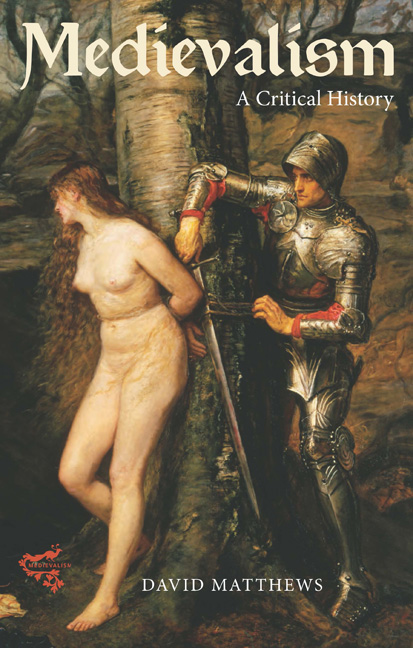Book contents
- Frontmatter
- Dedication
- Contents
- List of Illustrations
- Preface
- Acknowledgements
- Abbreviations
- Introduction
- I TAXONOMIES
- II TIME, SPACE, SELF, SOCIETY
- III HISTORY AND DISCIPLINE
- Conclusion Against a Synthesis: Medievalism, Cultural Studies, and Antidisciplinarity
- Afterword
- Appendix I The Survey of Reenactors
- Appendix II Key Moments in Medievalism
- Bibliography
- Index
Conclusion - Against a Synthesis: Medievalism, Cultural Studies, and Antidisciplinarity
- Frontmatter
- Dedication
- Contents
- List of Illustrations
- Preface
- Acknowledgements
- Abbreviations
- Introduction
- I TAXONOMIES
- II TIME, SPACE, SELF, SOCIETY
- III HISTORY AND DISCIPLINE
- Conclusion Against a Synthesis: Medievalism, Cultural Studies, and Antidisciplinarity
- Afterword
- Appendix I The Survey of Reenactors
- Appendix II Key Moments in Medievalism
- Bibliography
- Index
Summary
As we saw in the introductory chapter, the English adjective “medieval” was a relatively late arrival in the early nineteenth century, and when it came into widespread use it had to overcome the prejudice engendered by its predecessor “gothic.” If “medieval,” originally the neutral alternative to “gothic,” had had a longer history, then in the 1840s the word “neomedievalism” might have been coined instead of “medievalism.” Much might have been simplified thereby. Just as we understand the relation of neoclassicism to classicism, we might today have a terminology which drew a clear distinction between medievalism (meaning phenomena of the Middle Ages) and neomedievalisms, referring to recreations after the Middle Ages. A field called neomedievalism might have established itself in parallel with, even leading the way for, the field of neo-Victorian studies (the e-journal Neo-Victorian Studies was established in 2008). Alternatively, if Mittelalter-Rezeption had been adopted in English, there might have been a parallel field of medieval reception, in line with the rise in recent years of classical reception studies (a multivolume Oxford History of Classical Reception in English Literature is currently under way, with volume 3 appearing in 2012, while the Classical Receptions Journal was established in 2009).
But these things did not happen. Instead, with the appearance of the concept of medievalism in the 1840s, an ambiguity (sometimes a creative one) was opened up; medievalism was able to be deployed as a pejorative term with a dual sense of time, medieval and modern. In turn, with the apparent authority of John Ruskin, the term “medievalism” entered scholarly discourse in the late 1970s to indicate “the study of responses to the Middle Ages at all periods since a sense of the mediaeval began to develop” (to cite T. A. Shippey and the SiM website once more). At the same time, in the German-speaking world the term Mittelalter-Rezeption was developed for much the same purpose. The term “neomedievalism” was eventually coined in the 1870s but has not been influential until recently, chiefly in a specialised sense in which it indicates a new sub-branch of medievalism itself focusing on postmodern medievalisms.
- Type
- Chapter
- Information
- MedievalismA Critical History, pp. 165 - 182Publisher: Boydell & BrewerPrint publication year: 2015



